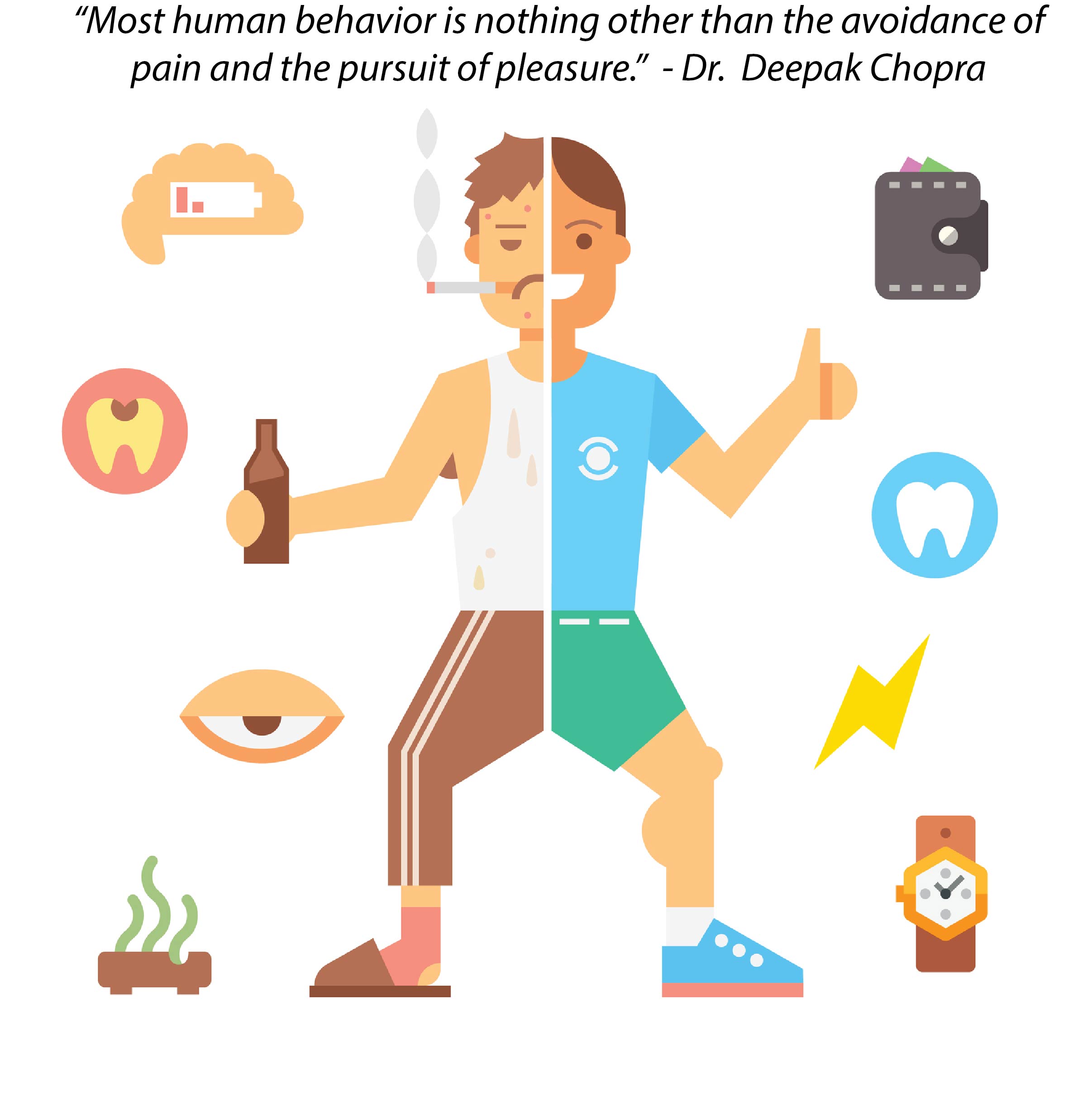Substituting One Addiction for Another

by Nirmala Raniga
“Most human behavior is nothing other than the avoidance of pain and the pursuit of pleasure.”
– Dr. Deepak Chopra
One way to look at how addictions form is through a metaphor that likens human memory to software programming of the brain. In this model, when we take an action, it “programs” us with either a good or bad memory and based on that physical or emotional feedback that formed that memory, we are compelled to take another action. If for instance, we eat a type of food that we really enjoy, then that leaves us with a good memory. That memory then causes us to want to have that food again. However, if we eat something that does not agree with us, that memory will remind us to avoid that particular food in the future and instead eat something that gives us pleasure.
Memories can be very useful tools. As an example, when we become educated, our memories allow us to apply our knowledge in our respective fields. However, when memory alone controls our choices, such as when we recall deep trauma and become triggered to respond in unhealthy ways, we need to take steps to regain our internal power.
As Dr. Deepak Chopra says, human existence can be a back-and-forth play between pleasure and pain-— a process that looms large in addiction. Addiction is one way people tend to deal with traumatic memories. When thoughts arise that cause us pain, those who suffer with addiction will turn to a behavior or substance that relieves that feeling and offers pleasure. However, this sense of relief is only temporary, and does nothing to address the painful memory that a negative experience has programmed into our software. Invariably, the pain will arise again, causing the addicted person to again reach out to self-medicate the pain away.
When an addicted individual finally decides to take control of her life and commit to recovery, he or she may replace the abused substance or behavior with another addictive behavior. Very often, those who stop drinking will turn for example, to smoking or even caffeine as a substitute for alcohol. Instead of substituting one substance for another as a way to address the pain arising, the recovering person must get to the root of the traumatic issues that led to the addiction in the first place. Only then, will this cycle be broken.
In order to address addiction and trauma at the root level, we must first accept ourselves as we are. A person can “uninstall the software” they have been operating on when one acknowledges that there is an addiction, without self-recrimination or judgement. In this way, a person can move forward into a healthier lifestyle and begin to break the cycle of abusing one substance after another to address traumatic feelings.
The next step is to reconnect with who we really are, pure consciousness. A consistent practice of meditation will enable us to come into stillness and access that space between our thoughts and memories, dipping into the place of true peace from which we all spring forth and through which we are all intrinsically connected.
Spending mindful time in nature is yet another way to find stillness. Seeing snow on the mountains or listening to the sound of ocean waves as the water ebbs and flows, we begin to understand the timeless, effortless interactions of pure being. At our core, we are one with nature. Therefore, revisiting the wonders of our natural world on a regular basis serves as a beautiful reminder of our perfection, which is infinite and unchanging.
There are other practices we can invite into our daily lives to help us reconnect with the true Self. Practicing yoga asana, or yoga poses, enables us to exercise the body while giving us an overall sense of peace. Chanting sacred mantras is another beautiful practice that helps us transcend time and space.
Spending time with those we love and doing things that we truly enjoy are also ways we can reconnect with pure consciousness. When we are with loved ones, laughing, talking, and enjoying ourselves, time flies. And, when we are engaged in activities that make us happy, we are truly living our dharmas-— our real purposes in life.
At the Chopra Addiction & Wellness Center, we help our guests address the trauma they have experienced in their lives. Through daily yoga, meditation, walks in nature, healthy eating, massage, and therapy with licensed and experienced counselors, our guests are encouraged and provided with the tools to move far beyond the place of pain and trauma and reconnect with the true Self, pure Spirit. In this way, our guests are able to live lives free from addiction and full of joy.
